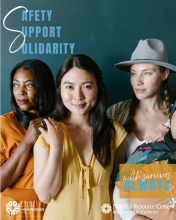By including young people, advocates have the capacity to teach them organizing strategies that will prevent violence, and they gain the opportunity to learn from young people on what does and doesn’t work as the violence prevention space continues to change.
VAWnet News Blog
This was the question we asked ourselves at our annual Domestic Violence Awareness Month (DVAM) planning meeting this year. As we dreamed up possible taglines and campaign imagery, our core messages felt crystal clear: Survivors deserve safety. Survivors deserve support. Survivors deserve solidarity.
This TAQ offers concrete tips, guiding questions, and ideas for how to support male survivors – from before your first client reaches out to your program to debriefing with your supervisor after you close their file.
This TAQ offers guidance on how organizations can create decision-making processes that stay true to their mission while strengthening relationships with stakeholders (i.e., anyone involved or affected by the decision).
This TAQ explores strategies for cultivating equanimity in the face of collective challenges, emphasizing how collaboration will sustain us in the work to end domestic violence.
In this TAQ, Dr. Johnanna Ganz discusses the concept of moral injury in domestic and sexual violence advocacy, its impact on career sustainability, and strategies for managing harm.



















